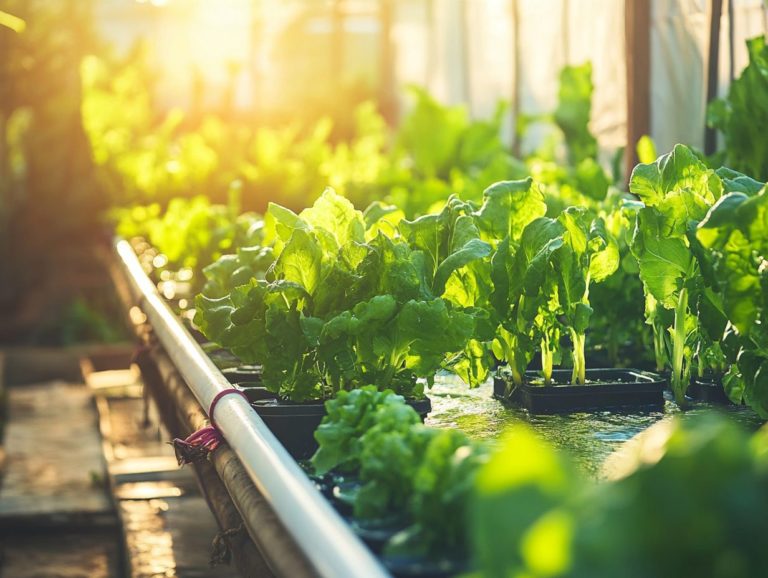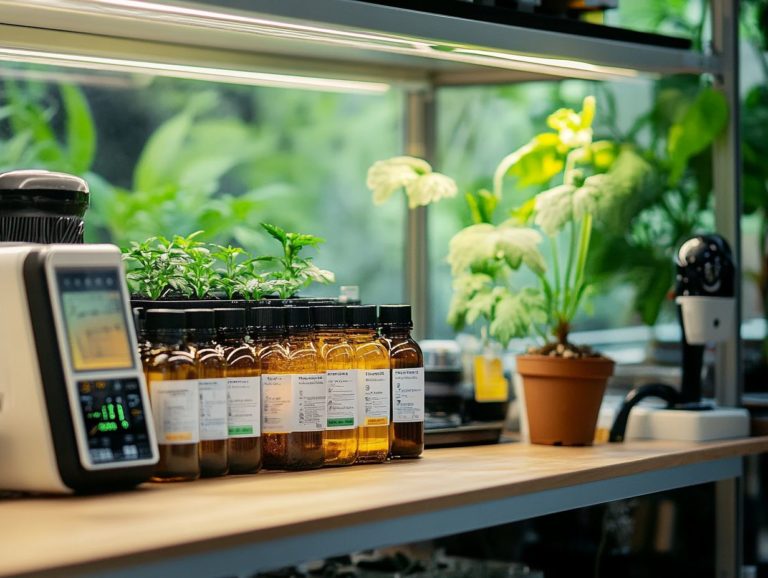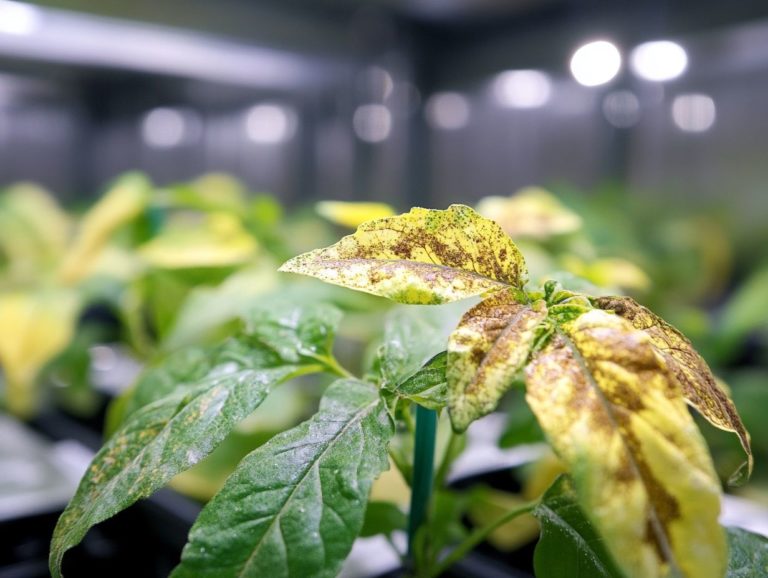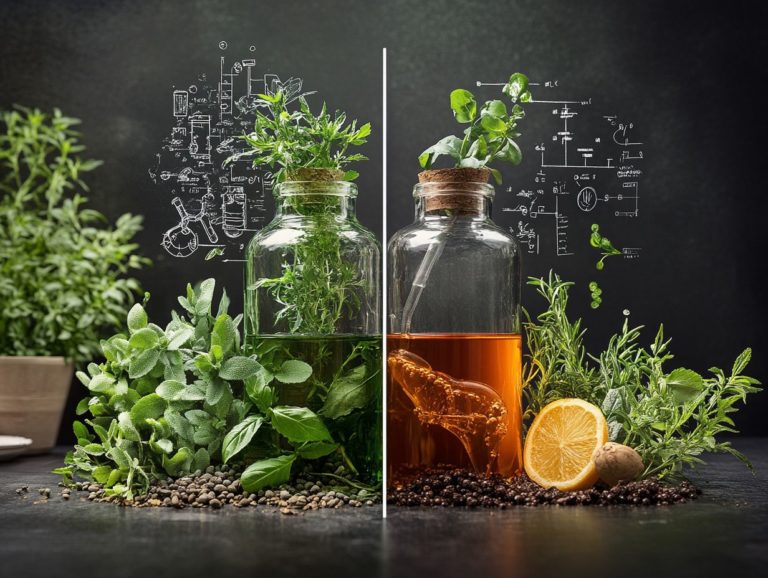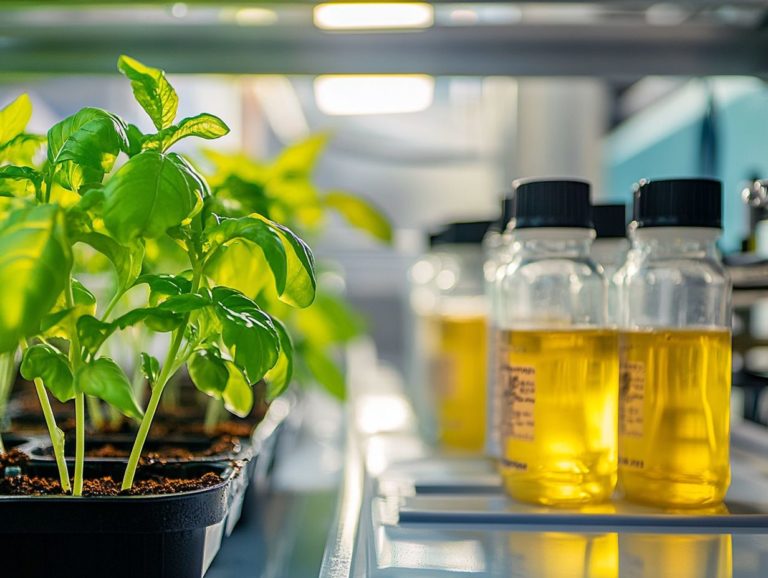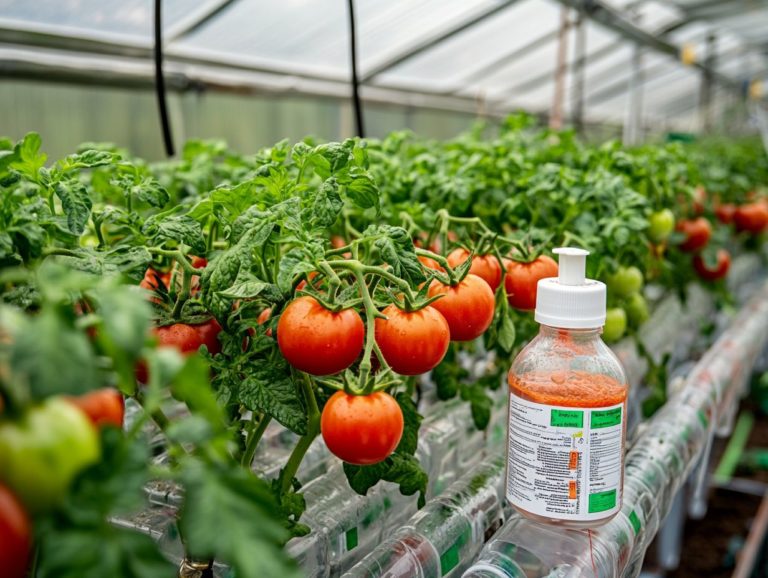5 Essential Nutrients for Hydroponic Roots
In the realm of hydroponics, nurturing healthy roots is essential for ensuring vibrant plant growth. Discover why these nutrients are crucial for your plants! By understanding the five key nutrients nitrogen, phosphorus, potassium, calcium, and magnesium you can significantly enhance the success of your indoor garden.
You’ll also find tips on the best sources for these nutrients and how to maintain optimal levels in your hydroponic system.
Join in to uncover the secrets to cultivating thriving hydroponic plants!
Contents
- Key Takeaways:
- 1. Nitrogen
- 2. Phosphorus
- 3. Potassium
- 4. Calcium
- 5. Magnesium
- Why Are These Nutrients Important for Hydroponic Roots?
- Frequently Asked Questions
- What are the 5 essential nutrients for hydroponic roots?
- Why are these 5 nutrients important for hydroponic roots?
- What happens if these nutrients are lacking in hydroponic systems?
- How can I ensure my hydroponic plants receive these 5 essential nutrients?
- Are there any natural sources of these nutrients for hydroponic roots?
- Can I use the same nutrient solution for all types of hydroponic plants?
Key Takeaways:
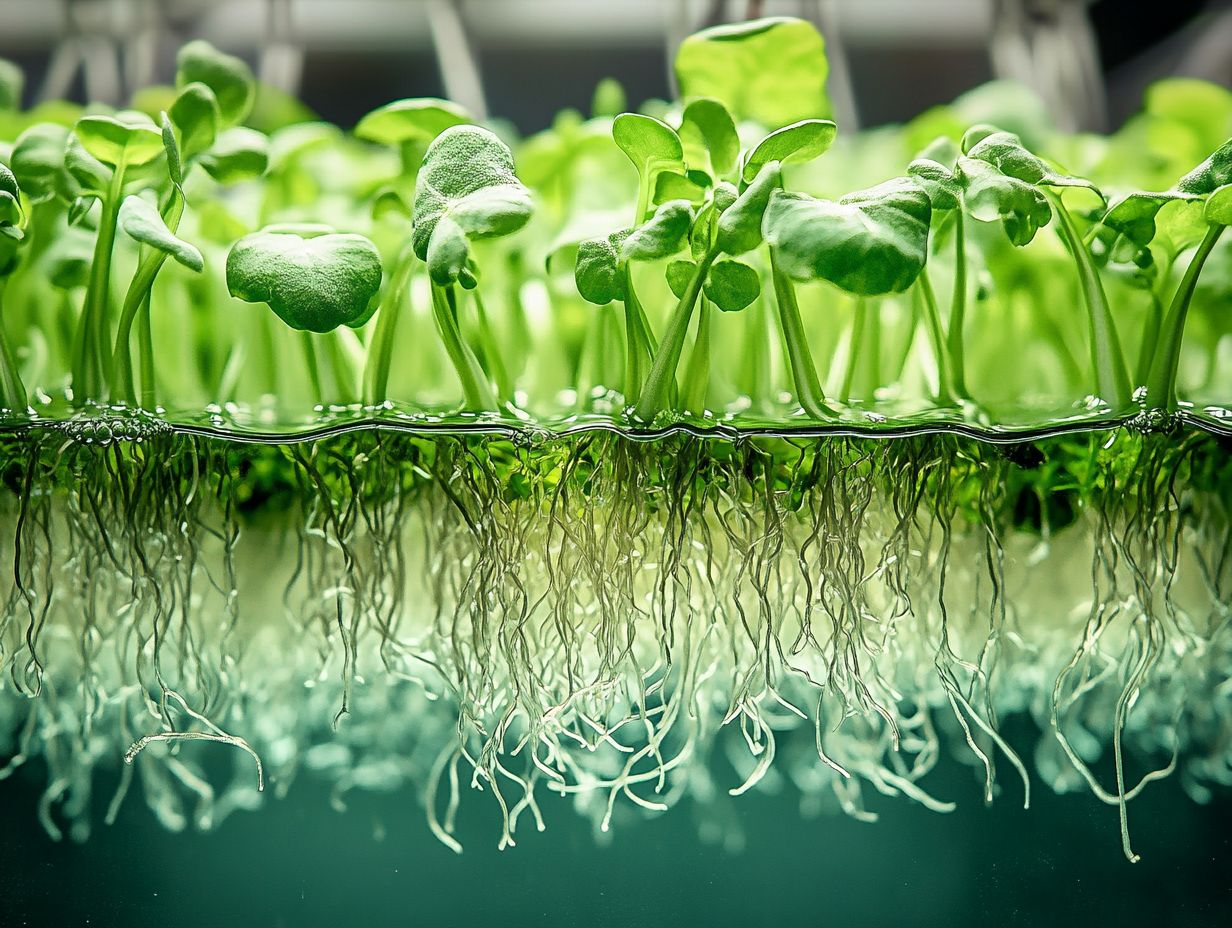
- Nitrogen, phosphorus, potassium, calcium, and magnesium are essential nutrients for hydroponic roots.
- These nutrients are key players in helping your plants grow strong and healthy.
- Signs of nutrient deficiencies in hydroponic plants include stunted growth, discoloration, and wilting. Regular testing and maintenance of nutrient levels in a hydroponic system are important.
1. Nitrogen
Nitrogen is a fundamental essential nutrient that you cannot afford to overlook when it comes to plant nutrition. Its role in the growth and development of hydroponic crops, like tomatoes, is nothing short of critical.
It directly influences chlorophyll production and overall plant vigor. This essential nutrient serves as a building block for amino acids, which are the precursors to proteins vital for various physiological processes.
Without sufficient nitrogen, your plants may struggle to synthesize proteins, leading to reduced enzymatic activity and stunted growth. A nitrogen deficiency can dramatically hinder chlorophyll formation, resulting in pale leaves and diminished photosynthesis efficiency, ultimately impacting your yield.
To maintain optimal nitrogen levels in your hydroponic system, it’s important to regularly monitor nutrient solutions and make adjustments as needed. Consider incorporating nitrogen-rich fertilizers or supplements during key growth stages, particularly during flowering and fruiting periods. You can also refer to these 5 must-know nutrient tips for hydroponics to ensure your plants thrive.
2. Phosphorus
Phosphorus is a critical essential nutrient that plays a vital role in your plants’ nutrition, facilitating energy transfer through adenosine triphosphate (ATP) and enhancing root development in various hydroponic systems.
This essential nutrient is instrumental in the flowering processes of many plants, promoting not just the formation of flowers but also the development of fruit and seeds. For anyone managing hydroponic systems, closely monitoring phosphorus levels in nutrient solutions is paramount. To find the right products, consider checking out 5 popular hydroponic nutrient brands reviewed.
Striking the right balance ensures that your plants can truly thrive, free from the limitations of deficiency. If phosphorus deficiency strikes, you may notice symptoms like stunted growth, dark green or purplish leaves, and lackluster flower production.
These signs serve as a reminder that timely adjustments to your nutrient solutions are crucial for maintaining optimal plant health.
3. Potassium
Potassium is vital for many plant functions, including nutrient uptake, water regulation, and enzyme activation, making it essential for hydroponic systems like deep water culture.
You ll find that potassium plays a crucial role in maintaining cellular turgor pressure, which is vital for plant stability and growth. It also aids in electrical conductivity, facilitating the efficient movement of ions and nutrients through plant tissues.
When potassium levels are optimal, your plants can better manage other nutrients, refining your overall nutrient management strategies. Keep an eye out for signs of potassium deficiency, which often include yellowing leaf edges, poor fruit development, and stunted growth.
Preventing such deficiencies in your hydroponic setups can be achieved by regularly monitoring nutrient solutions, adjusting potassium concentrations as necessary, and ensuring balanced pH levels. This approach promotes healthier, more resilient plants that thrive in their environment.
Don’t miss out on the chance to elevate your hydroponic garden to the next level!
4. Calcium
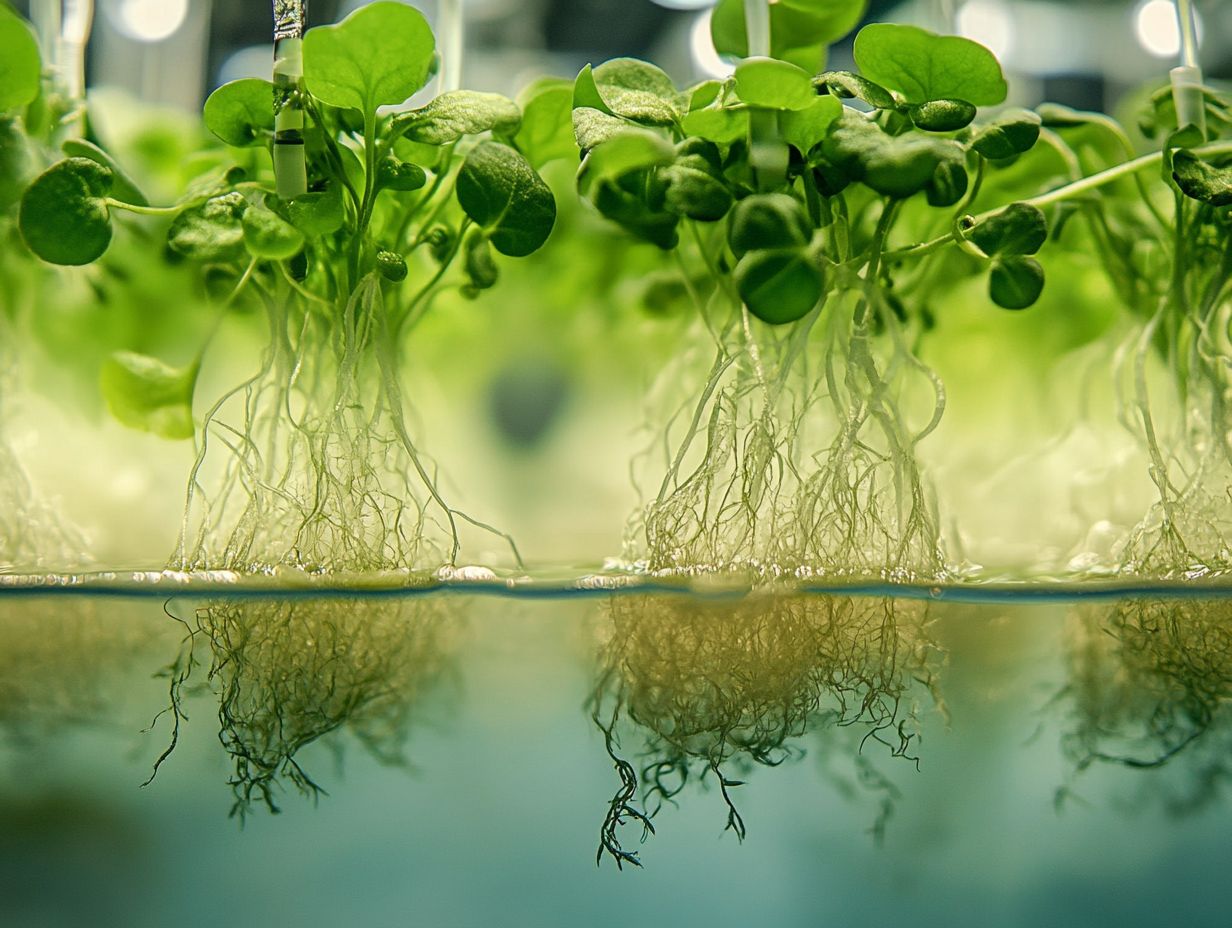
Calcium is a key nutrient that strengthens cell walls and membranes. This support is vital for metabolic processes in hydroponic plants.
Its impact on growth and resilience against diseases is significant. This essential element also facilitates crucial signaling pathways, enabling plants to respond effectively to environmental stresses.
When calcium levels dip, you might see problems like blossom end rot in tomatoes or tip burn in lettuce. This shows just how critical calcium is for keeping plants healthy.
To supplement calcium in your hydroponics, use calcium carbonate or calcium nitrate. Make sure to keep pH levels balanced.
Regularly monitoring the nutrient solution and keeping an eye out for deficiency symptoms such as stunted growth or browning leaf edges can help you maintain optimal calcium levels and avert potential crop failures.
5. Magnesium
Magnesium is crucial for chlorophyll, the green pigment that absorbs light for photosynthesis. This makes it essential for healthy plant growth.
By facilitating the conversion of sunlight into energy, magnesium significantly impacts plant vigor and yield. Without sufficient magnesium levels, your plants may struggle to synthesize the carbohydrates they need, resulting in stunted growth and reduced harvests.
To manage magnesium levels in your hydroponic system, closely monitor your nutrient solutions, ensuring a balanced mix tailored to your plants’ specific needs.
Symptoms of magnesium deficiency often show up as yellowing leaves, especially in older foliage. This is an unmistakable sign that intervention is needed.
By regularly testing your nutrient solution, you can prevent these deficiencies, fostering robust plant health and maximizing your yields.
Why Are These Nutrients Important for Hydroponic Roots?
Essential nutrients like nitrogen, phosphorus, potassium, calcium, and magnesium are vital for root development and plant health in hydroponics. These nutrients ensure that your plants can effectively absorb both water and nutrients from the grow media, paving the way for optimal growth and impressive yields.
Each nutrient has its unique contribution. For example, nitrogen is the secret sauce for vigorous growth and lush leaf development, while phosphorus is critical for establishing robust roots and facilitating energy transfer. Understanding the essential nutrients for hydroponic success can help maximize your gardening efforts.
Potassium plays a vital role in regulating water uptake, which is essential for maintaining osmotic balance within the roots. Calcium fortifies root cell walls, enhancing their structural integrity, and magnesium is key for chlorophyll synthesis, ensuring that photosynthesis runs smoothly. For a deeper understanding of essential nutrients, consider exploring the role of micronutrients in hydroponics.
Maintaining a balanced nutrient solution is paramount for your success in hydroponics. Any deficiency or imbalance can severely hinder nutrient uptake, leading to stunted growth and potential root deficiencies.
If nutrient management falls short, you may notice symptoms like yellowing leaves or weakened root systems, ultimately jeopardizing the health of your entire plant.
How Do These Nutrients Help with Plant Growth?
Nitrogen, phosphorus, potassium, calcium, and magnesium drive plant growth in hydroponic systems. These nutrients are your silent allies, crucial for chlorophyll production, root development, and overall plant vitality.
They significantly influence photosynthesis, promoting lush leaf growth and efficient energy production, which directly enhances the plant s ability to capture sunlight effectively.
Phosphorus is particularly vital for flowering; it stimulates the formation of buds and fruits, paving the way for a more bountiful harvest. Meanwhile, potassium regulates water usage and bolsters stress resistance, empowering your plants to flourish even amidst fluctuating conditions. For those interested in optimizing their yields, consider these 5 nutrient tips for hydroponic fruit production.
In hydroponic systems, these nutrients are readily available, ensuring that your plants receive the optimal levels they need for robust growth. This ultimately leads to healthier yields and increased resilience against pests and diseases, setting the stage for thriving plants in your care.
Unlock the full potential of your plants!
What Are the Signs of Nutrient Deficiencies in Hydroponic Plants?
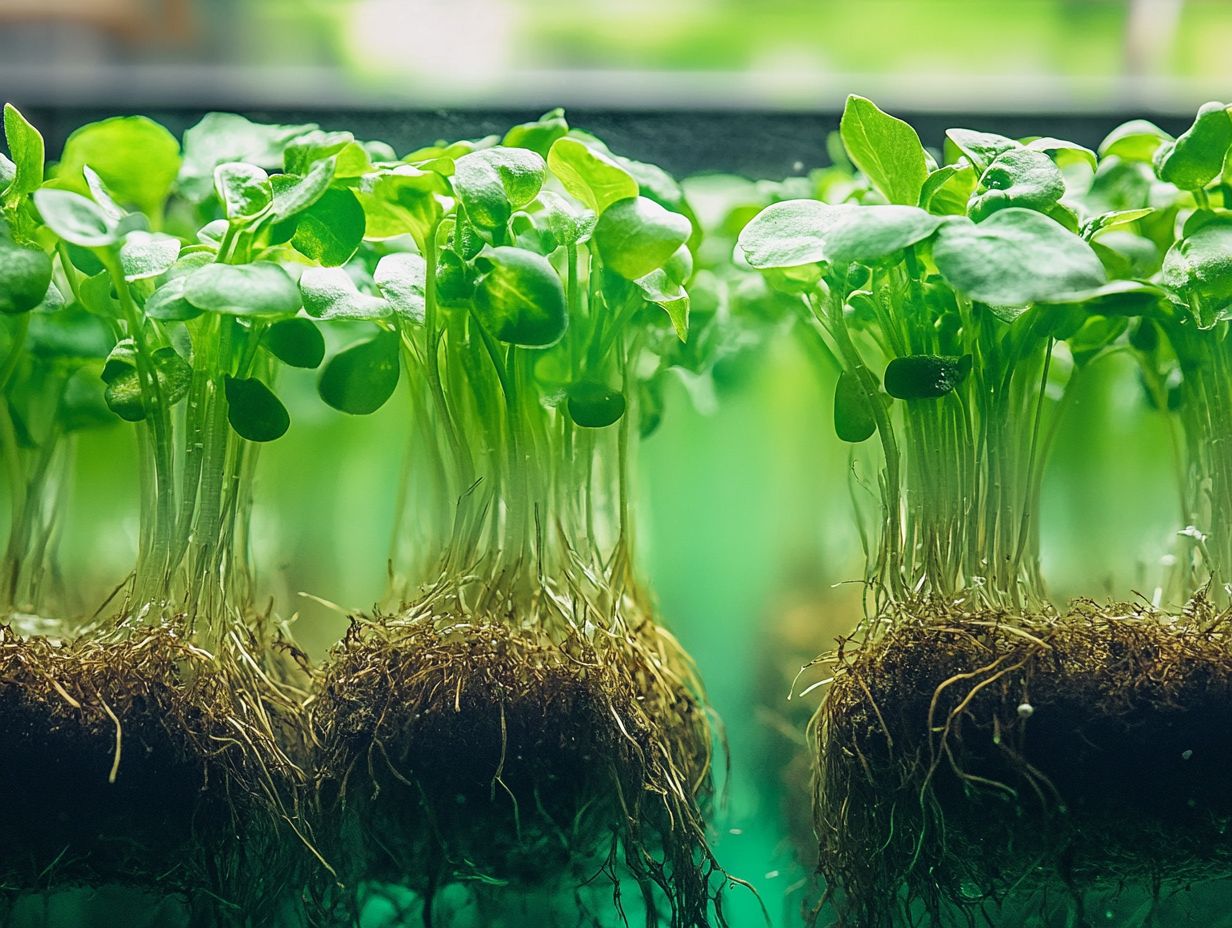
Recognizing the signs of nutrient deficiencies in your hydroponic plants is essential for effective nutrient management. Symptoms like yellowing leaves, stunted growth, and poor fruit development often signal deficiencies in crucial nutrients such as nitrogen, calcium, and magnesium.
Identifying these symptoms early can greatly enhance the overall health of your plants and prevent complications. For example, nitrogen deficiency typically shows up as older leaves turning yellow before they drop, indicating that the plant reallocates its resources. A lack of calcium can result in blossom end rot in fruits, negatively impacting both yield and quality.
By closely monitoring growth and staying attuned to visual cues, you can take prompt corrective action, whether it s adjusting nutrient solutions or amending the growing media. This proactive approach ensures your plants thrive and produce at their best.
What Are the Best Sources of These Nutrients for Hydroponic Plants?
The finest sources of essential nutrients for your hydroponic plants typically include expertly formulated nutrient solutions featuring soluble salts of nitrogen, phosphorus, potassium, calcium, and magnesium. This ensures your plants receive the balanced nutrition they need through their grow media.
In addition to commercial nutrient solutions, you might consider organic alternatives, such as bone meal for phosphorus or kelp extracts for vital micronutrients. These options can provide a more eco-friendly approach to nurturing your plants, and for those new to hydroponics, checking out the top 5 hydroponic fertilizers for beginners can be incredibly helpful.
No matter which nutrient source you choose, maintaining optimal nutrient availability is crucial. Regular monitoring of electrical conductivity (EC) and pH levels is essential, as fluctuations can significantly impact how well your plants absorb nutrients. A balanced pH typically ranges from 5.5 to 6.5, keeping essential nutrients soluble and accessible, leading to healthier, more productive growth in your hydroponic garden. To enhance your gardening experience, consider using the 5 essential tools for hydroponic gardening.
How Can One Ensure Proper Nutrient Levels in a Hydroponic System?
Ensuring the proper nutrient levels in your hydroponic system requires vigilant monitoring and management. Focus on key parameters like electrical conductivity, pH levels, and the balance of essential nutrients to promote optimal plant growth.
Routine testing is crucial; it gives you the power to detect nutrient problems that could jeopardize plant health before they become visible issues. When measuring pH, utilize calibrated pH meters for precise readings that maintain the correct acidic or alkaline balance necessary for nutrient uptake.
For assessing electrical conductivity (EC), an EC meter is invaluable for evaluating the concentration of nutrients in your solution. Regularly mixing fresh solutions helps maintain nutrient balance, and watch for signs of nutrient antagonism, where certain elements can hinder the absorption of others.
Keeping a log of your readings is valuable for tracking changes over time and guiding you in making informed adjustments as needed.
Frequently Asked Questions
What are the 5 essential nutrients for hydroponic roots?
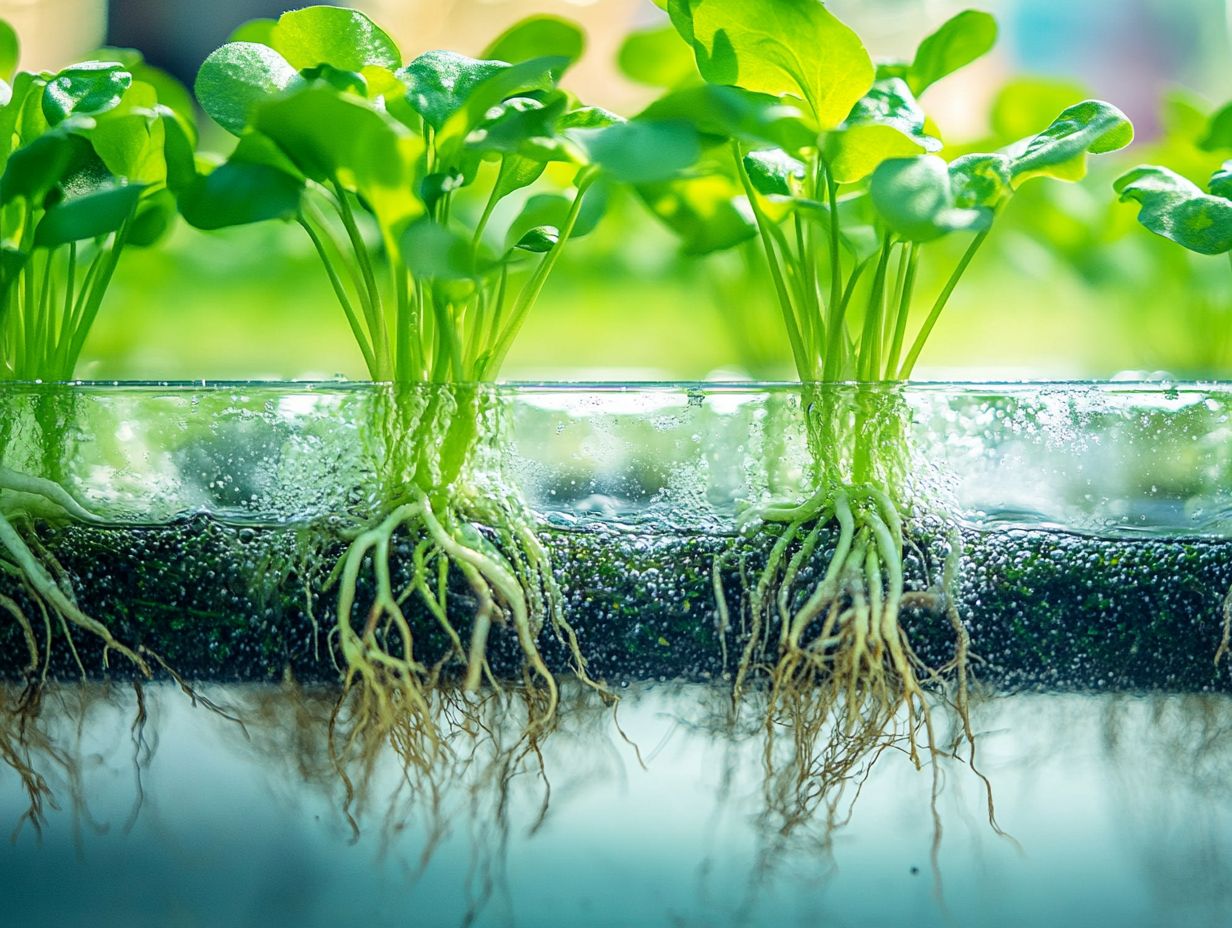
The 5 essential nutrients for hydroponic roots are nitrogen, phosphorus, potassium, calcium, and magnesium.
Why are these 5 nutrients important for hydroponic roots?
These 5 nutrients play crucial roles in plant growth, development, and overall health. Nitrogen aids leaf and stem growth, phosphorus supports root development, potassium promotes flowering and fruiting, calcium strengthens cell walls, and magnesium is a key component of chlorophyll for photosynthesis.
What happens if these nutrients are lacking in hydroponic systems?
If these nutrients are lacking, it can result in stunted growth, discoloration of leaves, and overall poor plant health. This may also lead to lower crop yield and decreased plant resistance to pests and diseases.
How can I ensure my hydroponic plants receive these 5 essential nutrients?
You can provide these nutrients through hydroponic fertilizers or by creating your own nutrient solution. Regularly testing and monitoring nutrient levels is key for a balanced system.
Are there any natural sources of these nutrients for hydroponic roots?
Yes! Natural sources include compost, fish emulsion, and seaweed extract. However, using these can make it harder to control the exact levels and ratios needed for optimal growth.
Can I use the same nutrient solution for all types of hydroponic plants?
No, different plants have unique nutrient needs. It s important to use a tailored nutrient solution that meets the specific requirements of your plants.
Excited to grow your hydroponic garden? Start experimenting today!

